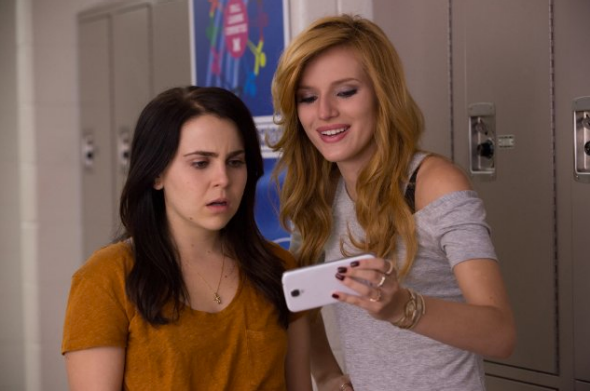In the new teen film The Duff, Bianca (Mae Whitman) walks down the hallways of her high school, surrounded by gawking classmates. They snicker at their smartphones, watching a video of Bianca swooning over her crush, Toby. Then the camera cuts to a short scene in which two girls on the high school’s front lawn discuss how embarrassing this video must be for Bianca with convincing sympathy—only to turn to each other and quickly agree to send it to everyone they know.
The movie, which stars Mae Whitman, Robbie Amell, and Bella Thorne, seems to have a good chance of becoming a new teen classic. It cast YouTube stars in cameos and campaigned heavily on Twitter. It raked in $10.8 million on its opening weekend, and the buzz among the high school demographic has steadily built since then. And the reason for this, at least in part, is a simple one: The Duff is offering the most realistic, interesting depiction of cyberbullying we’ve ever seen.
I know this because in high school, I was a victim of cyberbullying, too. I’m now 21, but back then FormSpring.me—a now-revamped site that allowed you to ask questions about your peers anonymously—was my classmates’ weapon of choice. I heard it all: You’re so annoying. You’re ugly. Kill yourself; no one cares about you. But for me, the most unbearable aspect of cyberbullying was not receiving those comments from anonymous people on social media; it was coming to school the next morning, knowing that my classmates were whispering about whatever had happened online the night before. For me, the scene where Bianca gets jeered at in the halls because of that cellphone video rings uncomfortably true.
So it’s not surprising at all that The Duff is a hit for viewers under the age of 24. For anyone who graduated after 2005–one year after the first showing of Mean Girls—social media was a hugely defining feature of the high school experience. The Duff is nothing like Mean Girls—at this point Regina George’s Burn Book feels relatively harmless and self-contained, like a relic from a distant teenage past.
Somehow, until now, no film has managed to capture the exact way in which cyberbulling and hallway bullying interact—the way the insults of social media bleed into the real lives of teens. Cyberbully—a 2011 ABC Family original movie—tried to tackle this semi-new phenomenon, but failed to really understand or unpack the mentality of teenagers who attack their peers online.
The Duff’s storyline may seem familiar: the odd-girl-out seeking advice from a more attractive and popular student. Bianca is boyish and quirky, with an impeccable academic record and a fondness for imitating monster voices. She happens to be best friends with two popular girls named Jess (Skyler Samuels) and Casey (Bianca Santos), and lives next door to the womanizing, athletic Wes (Robbie Amell.) When Wes tells Bianca that she’s the “designated ugly fat friend” of her friend group, Bianca is thrown into crisis. She confronts Jess and Casey to tell them she’s ending their friendship. She promises to unfriend (and unfollow) them on all social media apps. Then, reluctantly, she turns to Wes with a deal: She’ll help him pass his science class, if he helps her revamp her image to one with a higher social standing than the dreaded Duff. Packed with teen-centric pop culture references, the film is basically one big inside joke for anyone born after 1990.
The premise of The Duff—Mae Whitman as the “designated ugly fat friend”—can be a hard pill to swallow, even though the movie does try to elevate that into a message about positive body image. And the main aspect of the movie that felt off to me is the way Bianca’s high school administration reacts to her situation. After her teacher Mr. Arthur (Ken Jeong) and Principal Buchanan (Romany Malco) see the viral video of Bianca, Buchanan becomes paranoid and worries that the cyberbullying could escalate into something worse. So he orders all students to turn in their phone to their administrators at the start of the day; groaning students reluctantly hand over multiple cellphones each.
When I was in high school, though, the administrators did absolutely nothing about cyberbullying. No loudspeaker announcements or lectures or talks. The higher-ups mostly seemed bewildered by how, exactly, cyberbullying works. And these days, with the right technical skills—which many teens have now developed (have you seen Pretty Little Liars?)—it can be difficult for local school administrators to track the culprits of cyberbullying.
But this movie’s treatment of cyberbulling still sticks out as a uniquely honest depiction of a phenomenon that still gets too little attention. Take it from my 15-year-old sister, currently in the thick of the teen social media craze: “Popularity nowadays is purely based on how many likes you have on Instagram or how many followers you have on Twitter or friends on Facebook,” she said. “So social media is the perfect place for revenge.”
